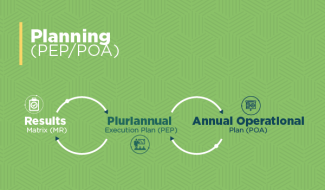

(POD) Pluriannual Execution Plan (PEP) / Annual Operational Plan (POA)
The Pluriannual Execution Plan (PEP) is the document that contains the project execution logic. Just as the Results Matrix reflects the logic of the intervention or theory of change, the PEP shows the execution strategy defined by the project team. The PEP is the key document that allows a correct transition from the design phase to the execution phase, it is also the document against which the project's progress is measured in the monitoring processes.
The PEP takes its basic structure from the Results Matrix - components and outputs - and is developed through the process of “integration”. Integration occurs when planning incorporates scope, time, and cost, thus combining the elements that make up the so-called “triple constraint”. In order to integrate scope, time and cost, the PEP development process requires analyzing the outputs in terms of required quality standards, procurement methods, resources and risk analysis.
Once the PEP is approved, the Procurement Plan (PP) and the Financial Plan (FP) are derived from it - how do we buy, and when do we pay? -. From the PEP, the Annual Operational Plan (POA) is also obtained, which is nothing more than the decomposition of the working packages of the PEP that are to be executed in current year. Since the PEP is multiannual, it is not efficient to decompose the outputs at lower levels, while in long periods the risks significantly affect execution and therefore alter planning. The decomposition of the work packages at the level of activities and tasks is recommended only when preparing the POA.
The first approved version of the PEP is called the “project baseline” and it is against this baseline that execution is monitored. For this reason, the baseline, or the information registered in the first approved version of the PEP, is transferred to the Project Monitoring Report (PMR) as “Planned” (P) physical and financial goals.
Annually, as a result of the monitoring process, the Control process is carried out, which is the revision of the planning according to the performance data. The Control process generates an update of the PEP, which in turn generates an update of the PMR (Pa) and the rest of the planning documents.
Since the PEP, or its annual version (POA), are the reference documents for execution and monitoring, it is highly recommended to develop them using project management tools such as Ms Project, Mindview or other similar software. A PEP that is not updated with actual execution data is a useless PEP. For this reason, it is not advisable to use tools that are difficult to update.
Finally, an important reminder: the PEP is not a list of outputs with start dates and budget, it is the document that shows the strategy or execution logic designed by the project team to ensure efficiency. A good PEP should show how we propose to execute the project and why do it this way.
Certifications
By completing the trainings related to this topic you can obtain certifications of different levels, which you can share on your professional networks and that can be very important for your role or career development.